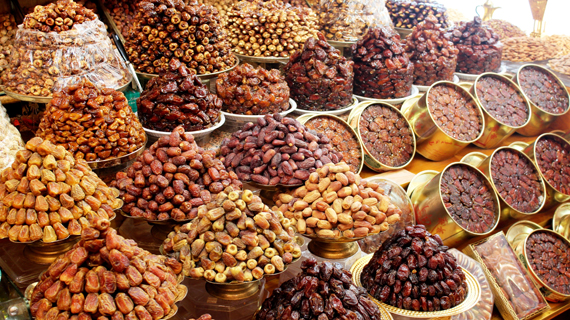
Al Jubail, Jul 28: Tonnes of local dates will find their way to Iftar tables this Ramadan, as families and residents queue up at the Dates Exhibition now going on just outside the fruits and vegetable market at Al Jubail.
An annual event organised by the Sharjah Municipality, the Dates Exhibition, which started on June 20 and will continue for three months, opens at 3pm until Iftar time.
Pakistani national Mohammed Aqbal said that the Dates Exhibition was a great initiative since people knew where to get the dates fast in such a hot weather, and get a chance to choose from so many kinds of dates in one place.
Ali Shaaban from Egypt said he went to the Dates Exhibition twice a week to buy at least three kilogrammes of dates for his family in Dubai. “I love the popular khaneizi. It’s so sweet and my kids like it.”
About 400 different kinds of UAE dates are on display, including lulu, khuddari, Nagal, khantaiz, khalas, khaneizi, sokari, and zahidi. A total of 25 shops are participating in this year’s exhibition.
Vishnu, an Indian date-seller, said his shop had many fresh dates, but the favourites were khaneizi, lulu and boumaan. “Daily, more than 200 customers come to buy, most of them come between 3pm and 5pm and an hour after Taraweeh prayers.”
Apart from Emirati families, expatriates from Saudi, Palestine, Iran, Iraq, Morocco, India, Pakistan, Egyptians and other Asians, Africans and Arabs also flock to the exhibition. The exhibition is aimed at helping date farmers to market and distribute their products and encourage them to grow more and different varieties of dates, said Sharjah Municipality Director-General Riyadh Aillan.
He said the exhibition was characterised by availability of all kinds of dates produced in the emirate.
“The municipality is very keen to support the farmers to increase the production and give more attention to date farming. The palm tree is a symbol of our origin and heritage, a source of good (insurance) for present and future.”
Al Aillan said the exhibition included 60 stalls in the fruits and vegetable market in Al Jubail area and Sharjah Cooperative Societies in Al Garayen and Helwan.






Comments
Add new comment